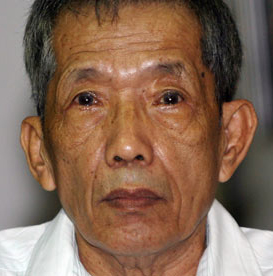PHNOM PENH, (Reuters) – The U.N.-backed war crimes tribunal in Cambodia ruled yesterday that the Khmer Rouge’s prison chief should serve the rest of his life in jail, extending a 19-year sentence handed down in July 2010 that outraged survivors of the “killing fields” regime.

The Supreme Court Chamber handling an appeal by Kaing Guek Eav, better known as Duch, ruled that the former chief of the notorious Tuol Sleng Prison should take full responsibility for the estimated 14,000 people killed there during the Khmer Rouge’s 1975-1979 reign of terror.
“The penalty must be harsh to prevent similar crimes, undoubtedly among the worst in human history,” the president of the court, Kong Srim, said in reading the verdict.
Duch stood up to hear the verdict and showed no emotion as the judge reeled off the crimes he had committed, including torture, murder, execution and enslavement.
Kong Srim described Duch as a “shocking and heinous character” who had overseen a “factory of death”.
Duch, 69, was found guilty in July 2010 in the only ruling by the multi-million-dollar Extraordinary Chambers in the Courts of Cambodia since it was established in 2005.
He had been given a 35-year jail term but that was immediately commuted to 19 years because of time already served in military detention, a decision that caused tears and anger among the families of those killed at the converted school, where thousands were subjected to torture at Duch’s behest. Duch, a born-again Christian who hid for two decades in Cambodia’s countryside, appealed against the decision, arguing that the court had no jurisdiction to try him because he was not a top commander of Pol Pot’s ultra-Maoist Khmer Rouge.
JUSTICE SERVED
The prosecution and civil parties also appealed, demanding a heavier sentence.
The prosecutors contended that 1.7-2.2 million people died of disease, exhaustion, starvation and execution under the Khmer Rouge, which drove people out of towns and cities and abolished money, schools and religion. The United States Ambassador-at-Large for War Crimes, Stephen Rapp, said the decision was fair, given Duch’s crimes.
“It’s a great day for Cambodia,” he told reporters outside the trial chamber. “It’s so important. Given the gravity of the crimes, it’s appropriate he received a life sentence.” The tribunal has also put the three most senior surviving leaders of the Khmer Rouge regime on trial, but they are elderly and in poor health and many Cambodians fear they will not live to see the end of their trial because of the court’s lengthy, bureaucratic procedures.
Pol Pot, the French-educated architect of the agrarian “year zero” revolution, died in 1998, having never publicly explained the motivation for the killing spree.





